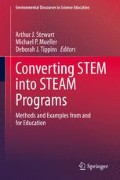Abstract
School districts are simultaneously organizations, systems, communities, and learning environments. Their mission, vision, and goal-setting processes emerge from complex dynamics that ultimately manifest in the construction and reconstruction of learning environments where teachers and students learn. Inquiry, which is the core of science, the arts, and the other STEAM disciplines, is re-ascending now in the pedagogical intentions and methods of K-12 learning across the globe. Here, we describe Rio School District’s 5-year inquiry process through which it placed transdisciplinary, reflective teaching and learning perspectives and approaches at the core of the District’s mission, vision, and improvement processes. In this chapter, we describe the various domains of activity that connect transformative processes in classroom teaching, learning, and design. These activities ultimately link to a three-year process of designing and constructing a new K-8 STEAM school centering on transdisciplinary inquiry. This process to date has resulted, for example, in a state-of-the-art school site, currently under construction, that is closely tied to the geography and indigenous history of its location, and in a faculty, that is engaging in a yearlong process to co-construct transdisciplinary curriculum and instructional approaches for the Rio STEAM Academy. We will further show how the Academy reflects the broader District-wide transformative processes from which school has emerged.
Access this chapter
Tax calculation will be finalised at checkout
Purchases are for personal use only
References
Anderson-Levitt, K. (2006). Ethnography. In J. L. Green, G. Camilli, & P. B. Elmore (Eds.), Handbook of complementary methods in education research (pp. 279–296). Mahwah: Lawrence Erlbaum & Associates for AERA.
Bloome, D., Carter, S. P., Otto, S., & Shuart-Faris, N. (2005). Discourse analysis and the study of language and literacy events: A microethnographic perspective. Mahwah: Lawrence Erlbaum.
Brafman, O., & Beckstrom, R. (2008). The starfish and the spider: The unstoppable power of leaderless organizations. New York: Portfolio. (Reprint Edition, July, 2008) (Penguin Group).
Castanheira, M., Crawford, T., Dixon, C., & Green, J. (2001). Interactional ethnography: An approach to studying the social construction of literate practices. In: Cumming, J.J. & Wyatt-Smith, C.M. (Eds), Special issue of Linguistics and Education: Analyzing the Discourse Demands of the Curriculum, Vol. 11(4), pp. 353–400.
Cochran-Smith, M., & Lytle, S. (2009). Inquiry as stance: Practitioner research in the next generation. New York: Teachers College Press.
EDLeader21. http://www.edleader21.com/
Fichtner, A. The unstoppable power of leaderless organizations. Hacker Chick Blog entry. Retrieved from https://hackerchick.com/the-unstoppable-power-of-leaderless-organizations/,10/11/2017.
Green, J., & Bloome, D. (1997). Ethnography and ethnographers of and in education: A situated perspective. In J. Flood, S. B. Heath, & D. Lapp (Eds.), Handbook for literacy educators: Research in the communicative and visual arts (pp. 181–202). New York: Macmillan.
Green, J., Dixon, C., & Zaharlick, A. (2003). Ethnography as a logic of inquiry. In J. Flood, S. B. Heath, & D. Lapp (Eds.), The handbook for research in the English language arts (pp. 201–224). Mahwah: Erlbaum & Associates.
Gronn, P. (2010). Hybrid configurations of leadership. In A. Bryman, D. Collinson, K. Grint, B. Jackson, & M. Uhl-Bien (Eds.), Sage handbook of leadership (pp. 435–452). London: Sage.
Klein, J. T. (2000). Voices of Royaumont. In M. Somerville & D. Rapport (Eds.), Transdisciplinarity: Recreating integrated knowledge (pp. 3–13). Oxford: EOLSS.
Marshall, J. (2014). Transforming education through integrated art-centered learning. Visual Inquiry: Learning and Teaching Art, 3(3), 361–376.
Puglisi, J. (2012). World-class learning organization 12/2/12. District website Superintendent’s blog entry. Rio School District. Retrieved from author personal archives, 10/7/17.
Santa Barbara Classroom Discourse Group. (1992). Do you see what we see? The referential and intertextual nature of classroom life. Journal of Classroom Interaction, 27(2), 29–36.
Seikmann, G. (2016). What is STEM?: The Need for Unpacking Its Definitions and Applications. Adelaide: National Centre for Vocational Education Research (NVER). Retrieved 10/11/17 from https://www.ncver.edu.au/__data/assets/pdf_file/002
Author information
Authors and Affiliations
Corresponding author
Editor information
Editors and Affiliations
Rights and permissions
Copyright information
© 2019 Springer Nature Switzerland AG
About this chapter
Cite this chapter
Puglisi, J., Yeager, B.V. (2019). Putting the STEAM in the River: Potential Transformative Roles of Science, Technology, Engineering, Arts, and Mathematics in School District Culture, Organization, Systems, and Learning Environments. In: Stewart, A.J., Mueller, M.P., Tippins, D.J. (eds) Converting STEM into STEAM Programs. Environmental Discourses in Science Education, vol 5. Springer, Cham. https://doi.org/10.1007/978-3-030-25101-7_13
Download citation
DOI: https://doi.org/10.1007/978-3-030-25101-7_13
Published:
Publisher Name: Springer, Cham
Print ISBN: 978-3-030-25100-0
Online ISBN: 978-3-030-25101-7
eBook Packages: EducationEducation (R0)

